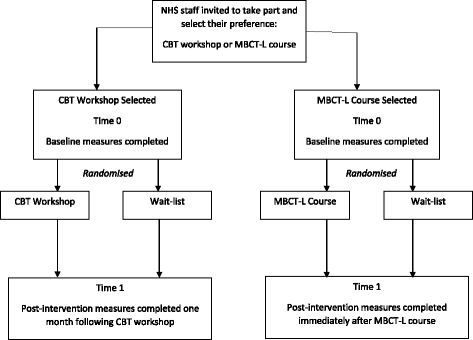Evaluation of mindfulness-based cognitive therapy for life and a cognitive behavioural therapy stress-management workshop to improve healthcare staff stress: study protocol for two randomised controlled trials
- PMID: 29606143
- PMCID: PMC5879876
- DOI: 10.1186/s13063-018-2547-1
Evaluation of mindfulness-based cognitive therapy for life and a cognitive behavioural therapy stress-management workshop to improve healthcare staff stress: study protocol for two randomised controlled trials
Abstract
Background: Healthcare workers experience higher levels of work-related stress and higher rates of sickness absence than workers in other sectors. Psychological approaches have potential in providing healthcare workers with the knowledge and skills to recognise stress and to manage stress effectively. The strongest evidence for effectiveness in reducing stress in the workplace is for stress-management courses based on cognitive behavioural therapy (CBT) principles and mindfulness-based interventions (MBIs). However, research examining effects of these interventions on sickness absence (an objective indicator of stress) and compassion for others (an indicator of patient care) is limited, as is research on brief CBT stress-management courses (which may be more widely accessible) and on MBIs adapted for workplace settings.
Methods/design: This protocol is for two randomised controlled trials with participant preference between the two trials and 1:1 allocation to intervention or wait-list within the preferred choice. The first trial is examining a one-day CBT stress-management workshop and the second trial an 8-session Mindfulness-Based Cognitive Therapy for Life (MBCT-L) course, with both trials comparing intervention to wait-list. The primary outcome for both trials is stress post-intervention with secondary outcomes being sickness absence, compassion for others, depression symptoms, anxiety symptoms, wellbeing, work-related burnout, self-compassion, presenteeism, and mindfulness (MBCT-L only). Both trials aim to recruit 234 staff working in the National Health Service in the UK.
Discussion: This trial will examine whether a one-day CBT stress-management workshop and an 8-session MBCT-L course are effective at reducing healthcare staff stress and other mental health outcomes compared to wait-list, and, whether these interventions are effective at reducing sickness absence and presenteeism and at enhancing wellbeing, self-compassion, mindfulness and compassion for others. Findings will help inform approaches offered to reduce healthcare staff stress and other key variables. A note of caution is that individual-level approaches should only be part of the solution to reducing healthcare staff stress within a broader focus on organisational-level interventions and support.
Trial registration: ISRCTN Registry, ISRCTN11723441 . Registered on 16 June 2017. Protocol Version 1: 24 April 2017. Trial Sponsor: Sussex Partnership NHS Foundation Trust (ResearchGovernance@sussexpartnership.nhs.uk).
Keywords: Burnout; CBT; Cognitive behavioural therapy; Compassion; Healthcare professional; Healthcare staff; MBCT; MBCT-L; Mental health; Mindfulness; NHS; RCT; Sickness absence; Stress; Wellbeing; Workplace.
Conflict of interest statement
Ethics approval and consent to participate
This study has been granted ethical approval by the Health Research Authority (HRA) in the UK (IRAS ID 224584). Informed consent will be obtained from all participants through completion of an online consent form. Important modifications to the trial protocol will be submitted for approval from the trial sponsor and HRA.
Consent for publication
Participants will be asked to consent to their anonymised data to be used in research publications.
Competing interests
CS has developed the 1-day CBT workshop and WK has co-authored the MBCT-L course. WK is Director of the Oxford Mindfulness Centre and Principal Investigator of several Wellcome Trust and NIHR funded grants examining mindfulness-based programmes. Any remuneration for public engagement or consultancy is donated in full to the not-for-profit charity the Oxford Mindfulness Foundation. CS is the Research Lead for the Sussex Mindfulness Centre and has received NIHR funding for research trials evaluating mindfulness-based interventions. CC and AW are employed by Health Education England (Kent, Surrey and Sussex) who have funded this study. All other authors declare that they have no conflicts of interest.
Publisher’s Note
Springer Nature remains neutral with regard to jurisdictional claims in published maps and institutional affiliations.
Figures
References
-
- Advisory Board, 2014. Health care workers may be the nation’s most stressed employees [WWW document]. https://www.advisory.com/daily-briefing/2014/02/13/health-care-workers-m.... Accessed 17 Oct 17.
-
- Antony MM, Bieling PJ, Cox BJ, Enns MW, Swinson RP. Psychometric properties of the 42-item and 21-item versions of the depression anxiety stress scales in clinical groups and a community sample. Psychol Assess. 1998;10:176–181. doi: 10.1037/1040-3590.10.2.176. - DOI
-
- Baer RA, Carmody J, Hunsinger M. Weekly change in mindfulness and perceived stress in a mindfulness- based stress reduction program. Journal of Clinical Psychology. 2012;68(7):755–765. 10.1002/jclp.21865. - PubMed
-
- Bernard P, Cullen C, Kuyken W. MBCT for life teacher manual. Oxford: Oxford Mindfulness Centre; 2017.
Publication types
MeSH terms
Grants and funding
LinkOut - more resources
Full Text Sources
Other Literature Sources
Medical
Molecular Biology Databases
Miscellaneous



